For animal lovers living in smaller spaces, it can be hard to find the right pet. There’s a lot to consider, from your building’s restrictions and noise levels to your budget and time commitment. However, of the more than 70 million pet-owning households, a large percentage live in an apartment – so you can likely make it work too.
Many pets thrive in apartments, the most common being cats and dogs. However, there are many other choices to consider that are great for small-space living. Be sure to take your time and ask plenty of questions before adopting a pet.
So whether you live in an apartment in Miami, FL, or a house in Seattle, WA, read on to learn more about the best pets for apartments and tips for living in a rental with your pet.
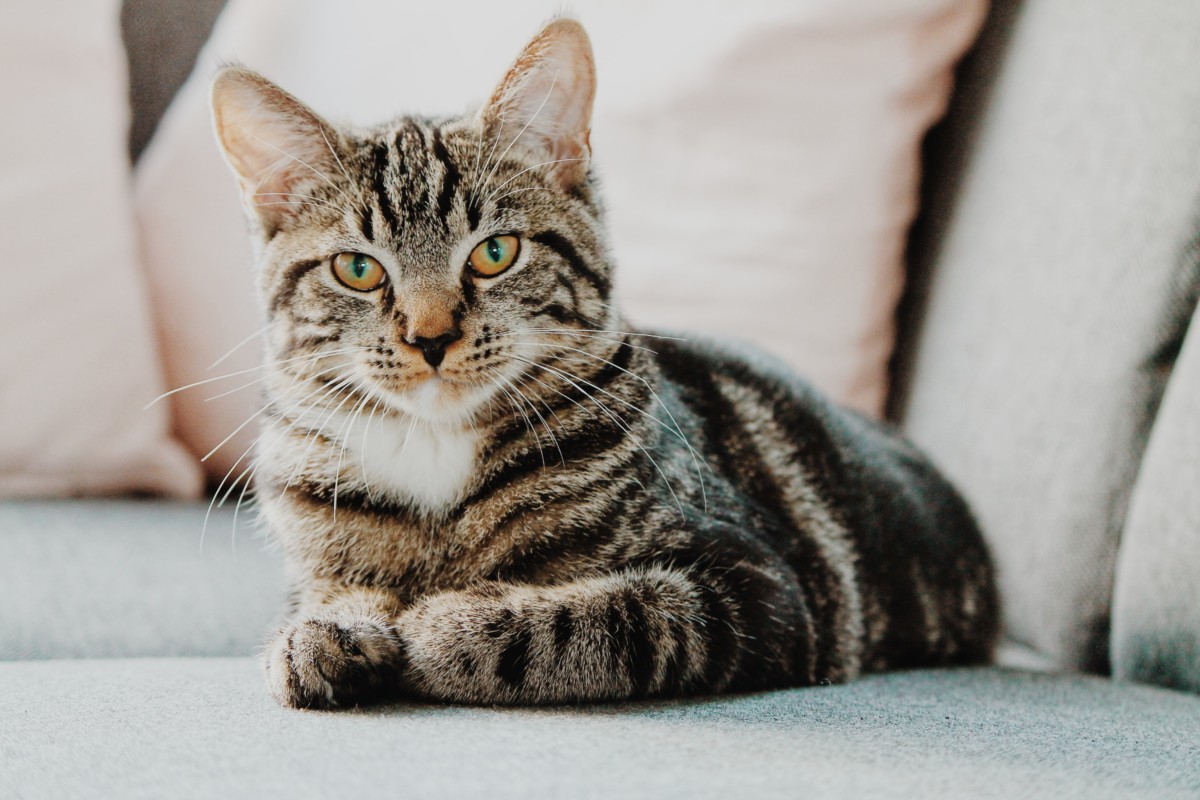
1. Cats
Cats are often considered the best pets for apartments. They’re small, quiet, independent, and sleep most of the day, making them great for owners who don’t spend much time at home. They’re also usually happy being indoor-only pets. As long as you spend some time playing and cuddling with them every day, they’re fun, low-maintenance pets.
However, finding the ideal cat breed for your situation is essential. For example, if you’re allergic to fur, make sure to get a hypoallergenic cat. The team at Wrinkled Bliss Sphynx suggests Sphynx cats for those with allergies: “Sphynx cats are a great choice for apartments because they don’t shed, are hypoallergenic, quiet, and don’t get separation anxiety.” Another hypoallergenic option is the Siberian breed. “They are often popular with pet owners who suffer from allergies,” says Liz Daisley from Daisley Siberians Cattery. “However, because of their busy-minded nature, consider taking them out in a cat stroller or on a walk with a harness to calm them down.”
There are several things you can do to make sure that your cat thrives in your home. Keep up with cleaning your litter box, and ensure you have a selection of toys and scratching posts to keep your cat entertained. Additionally, “keep track of what you’re leaving out on your counter,” says Donna DiGiovanni from Hairless Peterbald Sphynx. “Cats like to eat items they shouldn’t. Pay special attention to onions, garlic, dairy, grapes, caffeine, candy, and liver.”

2. Dogs
Dogs are the most popular pet in the U.S. What’s not to like about them? They’re playful, loyal, lovable, and affectionate. However, they also want attention and plenty of space to roam. If you’re considering bringing dogs into an apartment, “understand that not all small dogs are fit for apartment living; every dog has a unique personality, and some are more adaptable than others,” notes Niki Solomon from Petsies. “Before bringing a pet home, it’s important that your pet is a good fit for you and that your environment is a good fit for them.”
Many people think larger dogs are less fit for apartments, but size isn’t always the biggest factor to consider when looking for your new pet. Large dogs are often happy spending hours on the couch, while some smaller dogs are full of energy and bark at the slightest sound. Excessive barking is a common reason for noise complaints, so ensure you spend plenty of time with your pup, take them outside daily, and reinforce positive behaviors. For example, “if your dog gets too excited when they see another dog, help them by reinforcing preferred behaviors,” advises Erin Vejar from Woof! San Diego. “You can do this by using a clicker or a specific word to mark the moment your dog chooses to do the behavior and follow your click with a treat.”
Regardless of size and breed, dogs are generally loud, social animals. “If you live in an apartment, providing extra mental stimulation can be a great way to meet your dog’s needs and keep them from barking,” says Lisa Goetz from The Vegan Petsitter. “Try giving meals and snacks in a food-dispensing toy, puzzle, or snuffle mat instead of a simple bowl.”
Pro tips: prevent your dog from looking outside and keep them entertained
Ellen Naumann from Ellen the Dog Trainer has tips for owners with loud dogs. “Many people believe letting their dog look out the window gives them something to do when they’re home alone,” she says. “However, this often leads to barking and noise complaints. Prevent this by blocking your dog’s view with decorative cling film applied to the lower half of the window.”
Andrea Augustine from Madrona Real Estate and Solis, suggests playing music or leaving the T.V. on when you go for the day. “Many dogs suffer separation anxiety and bark when you leave,” she says. “Help avoid this by leaving music on or while you’re not home. Background noise can help prevent your dog from barking, saving you from noise violations.”
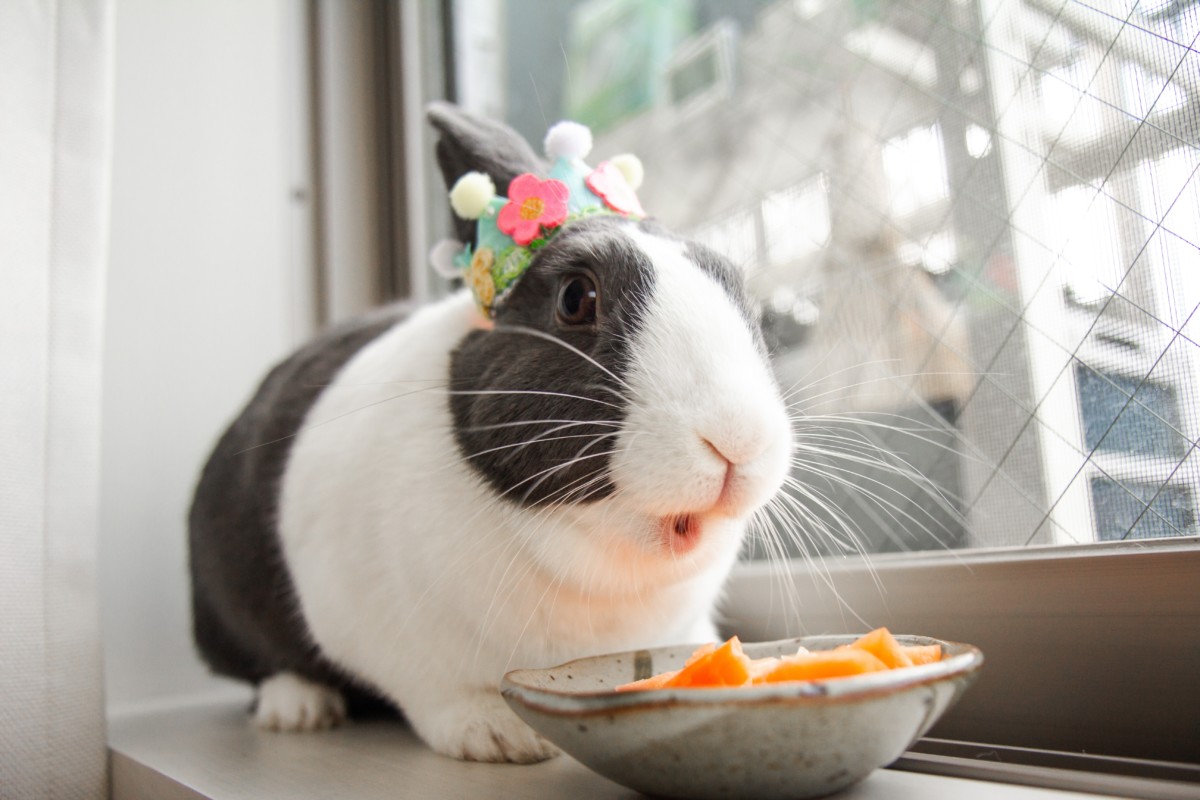
3. Rabbits
Rabbits are an excellent choice for renters with minimal space. They can be affectionate, warm, and social pets, but can be more complicated to care for than cats and dogs. Many breeds of rabbits are suitable for indoor living, including the Havana, the Holland Lop, and the Netherland Dwarf. If you plan on adopting a rabbit, consider getting a pair for socializing.
There are generally three ways to live with a rabbit: you can keep them in a cage at all times, put them into a cage at night, or let them roam free. “Rabbits don’t need a lot of space and are typically very quiet,” notes Lynnsey McCarter, an Atlanta, GA, real estate agent. “All you need is to set up a small area where they can roam and a litter box. However, make sure to litter box train them to avoid losing your security deposit.”
Additionally, rabbits can be notorious chewers, so “make sure to rabbit-proof your space until you know your bunny’s personality,” notes Avery Edwards from Disher, Hamrick & Myers. “They often like to dig, chew, and jump on anything they can reach, including cords, couches, blankets, pillows, and any other soft materials.”
Pro tips: set up a space for your pet supplies and be sure to spot clean
Rabbits can be dirty. Demi from Summit Property Management suggests designating an area in your apartment where you can keep a bed, toys, food, water, and other pet supplies all in one place. “Additionally, be sure to keep cleaning supplies nearby, including a small vacuum, dusters, and pet odor and stain removers,” she says.
Stay on top of minor mishaps to keep your home clean. “Stains and odors can easily build up, especially if you have rodents or other small animals,” notes Tommy Shankland from Skout’s Honor. “Fortunately, the Severe Mess Stain & Odor Solution from Skout’s Honor can tackle the worst of these messes.”
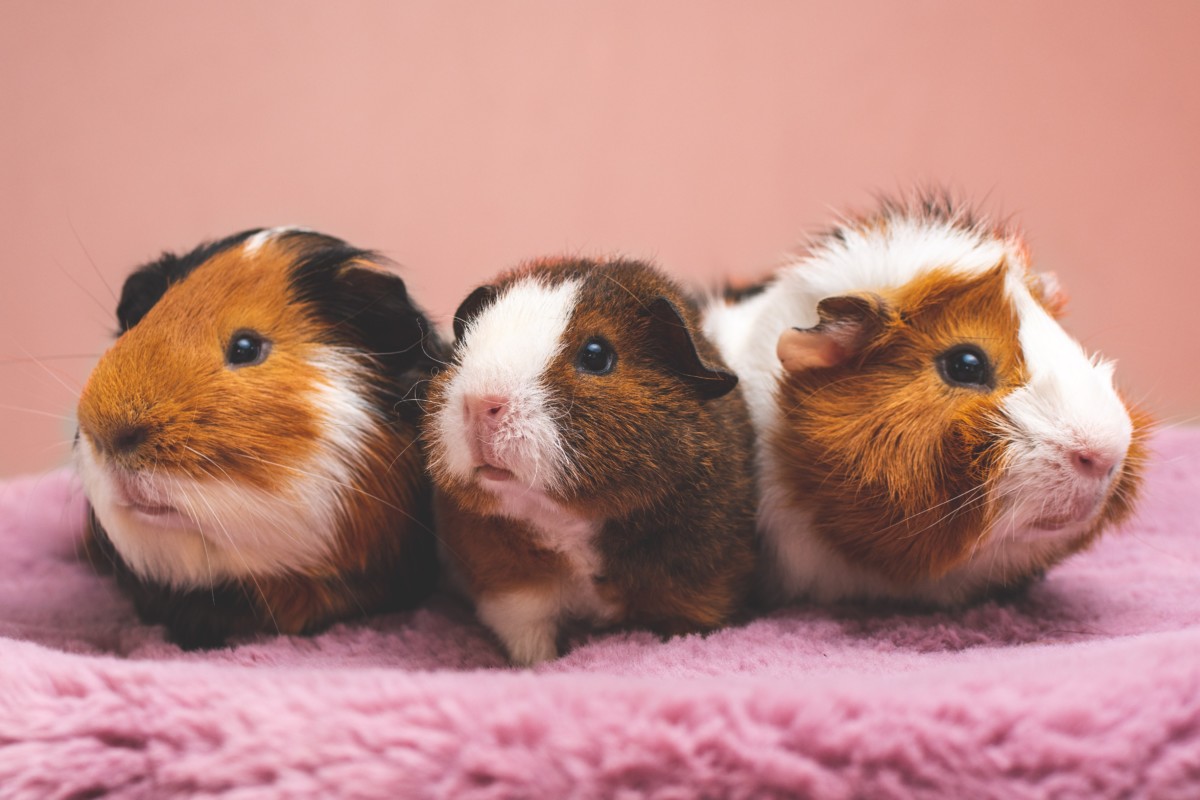
4. Other rodents
Contrary to popular belief, most rodents are actually quite loving and affectionate. There are four popular rodents that people keep as pets: hamsters, guinea pigs, gerbils, and mice. They all tend to prefer similar caged habitats and thrive in small spaces like apartments. If you want to let rodents run around outside of their cage, “always have a supply of pet-friendly cleaning products on hand and use a wet cloth to deal with messes as soon as they happen,” says the team at Custom Cleaning of the Treasure Coast.
Hamsters
Hamsters are easy to care for, are relatively inexpensive, and can be a great fit for apartment living. It’s important to note that while they can be social, they are prone to fighting. As such, unless you’re specifically looking for a breeding pair, hamsters should live by themselves. And while they can be fun to play with, they also need time alone. Hamsters are also nocturnal and play at night, so if you’re a light sleeper, don’t keep their cage in your room.
Guinea pigs
Guinea pigs are a larger rodent species but are still great for apartment life. Similar to rabbits, they’re more social and friendly than hamsters and are diurnal (awake during the day, asleep at night), meaning they’re more suitable for bedrooms. “They are a great pet to have in an apartment as long as you have a proper enclosure for them,” says Gary Ashton, CEO of The Ashton Real Estate Group. “They are low maintenance, friendly, and don’t make loud noises.”
Additionally, guinea pigs need time every day to play outside of their cage and run around – just ensure they are litter box trained. Depending on the breed, you may need to brush them every day or so, as their fur can get quite long. Like rabbits, tuck away any cords or soft materials so the guinea pigs don’t mangle your belongings.
Gerbils
Gerbils are fairly intelligent animals and enjoy socializing with people. Make sure to provide plenty of bedding and digging materials in their cage; they love to shred and burrow throughout the day. Like most rodents, they’re easy to care for and are pretty independent. However, don’t let them out of their cage unless you want to lose your security deposit.
Rats
Despite their reputation, domesticated pet rats are a popular family pet option as long as they are given proper care. They are very social, loving, intelligent, and can even be trained to do tricks. If you adopt them at a young age, they are relatively docile and rarely bite. Because they are opportunistic eaters, they tend to eat whenever and however they can. Because of this, don’t feed them too much or too regularly. Given plenty of enrichment and love, rats are great pets for apartments.
Mice
Given their small size and relatively simple needs, mice make great pets for apartments. While not as social as other rodents, try to adopt more than one (of the same sex) at a time so they have company. Mice are usually content with a simple cage, food dish, a drip water bottle, and an exercise wheel.

5. Fish
While dogs might be the most popular pet, fish are the most numerous, with nearly 160 million fish kept as pets. They are a terrific option for anyone unable to devote time and space to larger, higher-maintenance companions. Owning a fish is perfect for small spaces as well – all you need is a tank, water, filter, food, and enrichment. If you want more fish, simply get a larger tank (note that bigger tanks require more upkeep).

6. Reptiles
Reptiles aren’t traditional companions but are easy to care for and can be a great fit for apartments. Many species take up a relatively small amount of space, are quiet, and can be left alone for long periods without feeling abandoned. However, each animal has different requirements, so study what your new pet needs to thrive.
Snakes
Snakes are easy to care for, require a small habitat, and can be very social, making them great for apartments. However, before adopting a snake, research its full-grown size; many breeds grow to more than 4′ long and can be challenging to manage. Take note of specific dietary needs as well. Corn Snakes, Ball Pythons, and King Snakes are all excellent choices to keep as pets, particularly in smaller spaces.
Turtles
Turtles can be complicated to keep as pets but can be a great option as long as you’re willing to cater to their specific requirements. Most have complex feeding and habitat requirements, and some can have health issues. It’s vital to research the particular details of the breed you’re looking at to ensure that you can provide what they need.
Lizards
Lizards are social pets once they bond with humans, but they require attention and care. They are happy to remain in their enclosure for most of their lives, basking under a heat lamp, but enjoy time outside as well. It’s important to note that lizards need warmth in their enclosure 24 hours per day and an area to cool off. The Bearded Dragon, Blue Belly, and Leopard Gecko breeds are all great pet options.
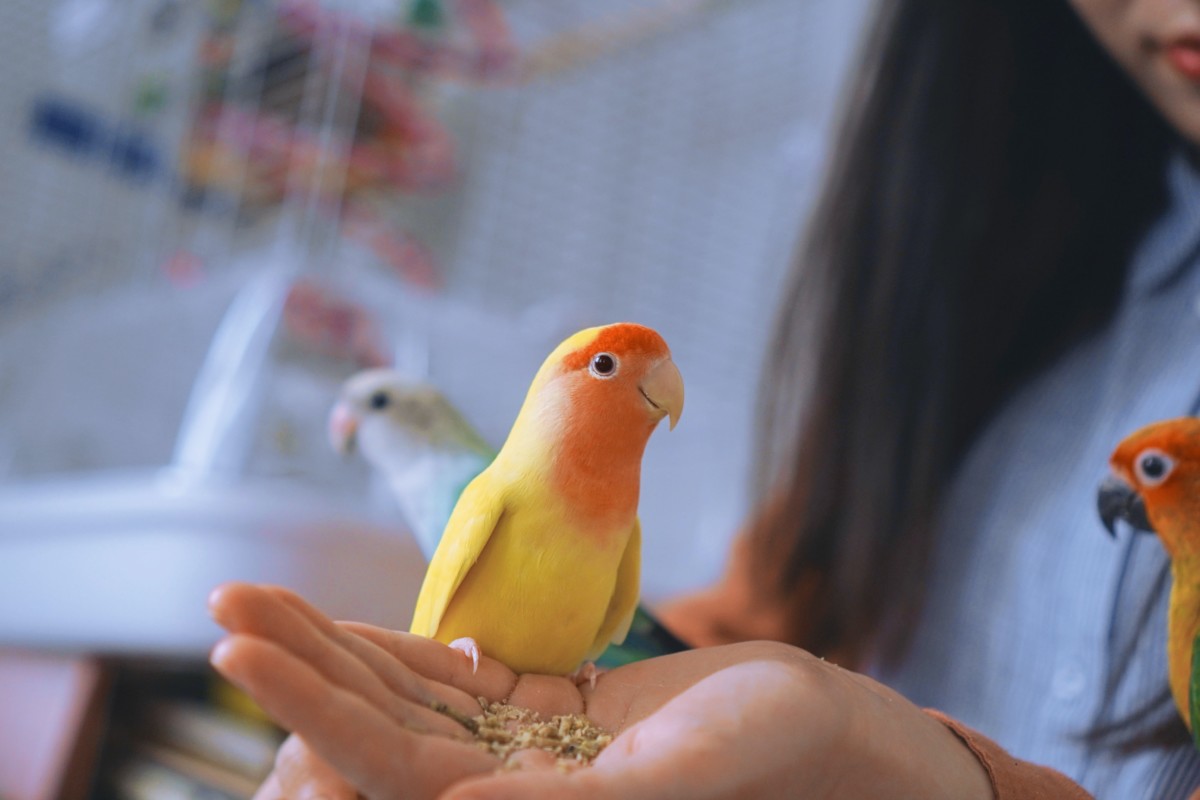
7. Birds
Birds can live upwards of 50+ years, so be ready to take on a lifelong commitment before adopting one. They can make excellent pets but are a challenge for apartments for three reasons:
- Noise: Most birds are quite loud. Keep them entertained to avoid noise complaints.
- Neediness: Once bonded, they will likely want to be around you for long periods of time. Give them lots of attention and set boundaries if possible.
- Intelligence: Most birds are extremely smart and can be destructive if they don’t get what they want. Keep this in mind when selecting your pet.
Regardless, many birds can happily live in a small home, especially quiet breeds. Cockatiels, Canaries, Budgies, Finches, and Parrots are all popular options.
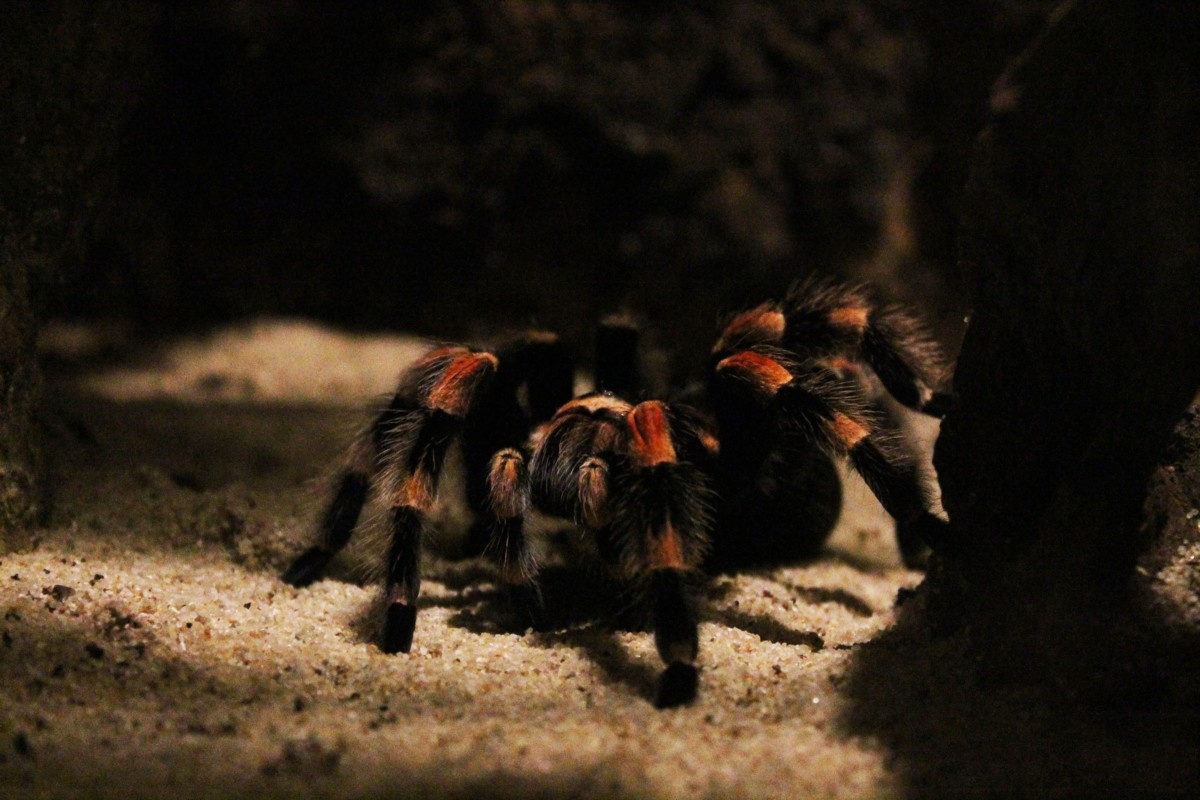
8. Insects, arachnids, and crustaceans
These are the least common pets on this list but are still great options for apartment homes. If you love creepy crawlers, these pets are for you.
Insects
Insects are very easy to maintain. They take up very little space and only need to be fed periodically. Most pet insects are herbivores and primarily eat fresh leaves and leafy greens. Popular insects include ant farms, cockroaches, and praying mantises.
Tarantulas
Tarantulas are easy to take care of, requiring only a 5-gallon tank, feeding, and cleaning. Importantly, they exclusively eat live food, so if you’re squeamish, these pets aren’t for you. Not all species are appropriate to keep as pets, but the Chilean Rose, Brazilian Black, and Mexican Red Knee are great options for beginners.
Scorpions
Before adopting a scorpion, research the particular breed; they can be either desert or jungle species, which determines their habitat. Additionally, they are cold-blooded, so they need a heat source in their habitats. Don’t pick up a scorpion to avoid stings, and don’t adopt them if you have kids. If they still seem like a good fit, consider the Emperor and Dictator varieties.
Hermit Crabs
While technically a crustacean, hermit crabs live on land. They can happily live in a warm, humid glass aquarium filled with a layer of sand, a couple of water bowls, and a piece or two of driftwood to climb on. Hermit crabs molt about twice a year, shedding their shells and moving into new ones. Be sure to keep a few empty shells in the tank for them to choose from.
What if your building doesn’t allow the pet you want?
The majority of rentals only allow cats and dogs, while some others don’t allow pets at all. The Long Island Bird & Exotics team, an exotic pet vet clinic, comments: “Before you bring a new pet to your apartment, it’s important to note any pet or breed restrictions your building may have. Check if your town or city has any laws against certain animals as well.”
Make sure you’re transparent about your pets, and don’t try to sneak them in. “If you misrepresent information, your landlord may terminate your lease,” says the team at Bell Property Management. “Keep it simple and tell your property manager about your pet during the application process to avoid issues.”
Set up a pet interview
If your building or landlord has a no-pet policy or doesn’t allow your animal, consider setting up a meeting with them to get to know your pet. “Be open and honest with your landlord about your pet,” says Robert Dekanski, Team Lead of The Dekanski Home Selling Team. “If you have a dog, especially a mixed breed, set up a meet and greet so your landlord can get to know your pup.”
Wendy Ross, broker-owner of Veracity Real Estate, suggests educating your landlord about your pet in an interview. “Talk about your pet’s characteristics and habits. To be extra thorough, attach a pet resume to your lease applications.”
“Before the interview, make sure your pet is well-fed, has had their exercise, and is in a good mood,” says Chris Tanaka from Sound Property Management. “It’s also a good opportunity to answer any questions and convince them if they were on the fence about larger pets.”
Support animals are not pets
Additionally, remember that support animals aren’t considered pets and legally cannot be excluded from any property according to the Americans with Disabilities Act (ADA). If you have an exotic pet or live in a rental that excludes pets, consider registering your pet as a support animal.
Tips for landlords: allow pets to generate more interest
Many rentals don’t allow pets, which can be a big negative for many renters. If your building isn’t attracting enough interest, consider adjusting your rules. “Remember that you’re still able to say no to pets depending on their size and breed,” advises Violette Varenkova from IIP Management. “If you’re considering allowing a pet, be sure to consult your building’s insurance; there are often restrictions that you can’t avoid.”

Best pets for an apartment: final thoughts and recap
- Check your lease: Before adopting a pet, carefully review your lease for any restrictions and additional deposits. “Most apartment complexes limit tenants to two pets per unit,” says Todd Morton, a Virginia Beach Real Estate agent. “They also often have additional restrictions such as weight limitations, breed restrictions, and non-refundable security deposits for both animals.”
- Research local ordinances: Some cities and towns have laws limiting the types of exotic animals you can keep as pets. Save yourself time and money by checking with the city clerk’s office to confirm the rules in your area.
- Consider your space and availability: If you are allowed to have a pet, take the time to evaluate your space and schedule. Remember, cleanliness is key. “Be sure to keep a towel and spray bottle on hand to wipe any dirty paws off before they run around your home,” says the team at NW Maids.” If you can’t adequately accommodate a pet, don’t get one.
- Prep your rental: Store hazardous chemicals, put away fragile and valuable possessions, and consider deterrent sprays or protective wraps for your furniture. “Remember, animals can be very crafty and creative when it comes to getting into things,” advises Elissa Weimer from Paw & Order Dog Training. “Be extra very careful with bathroom trash, which can cause blockage.”
- Get renters insurance: Most buildings require that you have insurance, but be preventative. Additionally, “consider pets who are covered by your renters insurance,” notes Ryan Scotson from Icon Realty Associates. “Most insurance companies have a list of restricted breeds that aren’t covered, typically including dog breeds such as Pit Bulls, German Shepherds, Rottweilers, and more.”
- Think about your neighbors: You don’t want noise complaints on your record, so be mindful and don’t adopt an excessively loud pet.
Welcoming a pet into your home can be a very fulfilling and rewarding experience, regardless of your rental’s size. Take the time to evaluate what you can offer and what the pet you’re interested in really needs so that you make a choice that is best for everyone.




















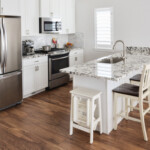





 United States
United States Canada
Canada